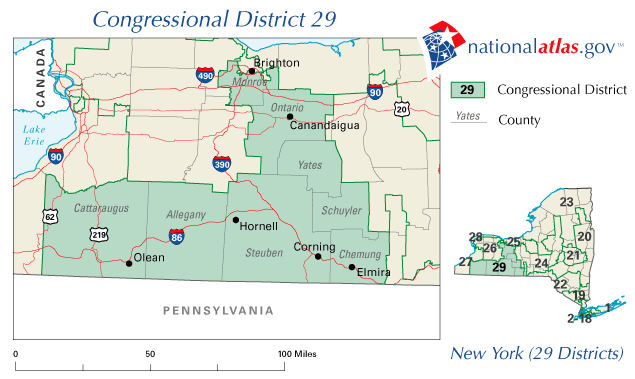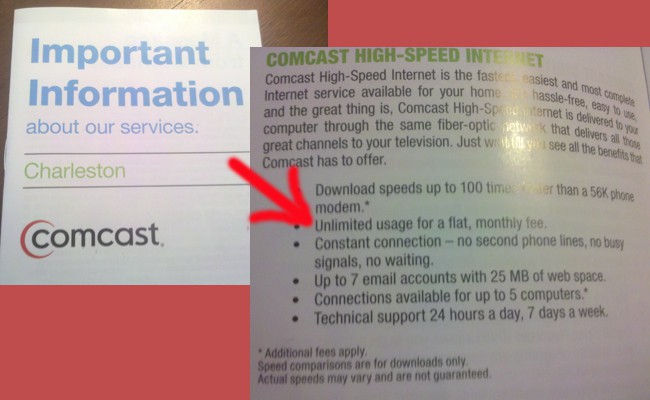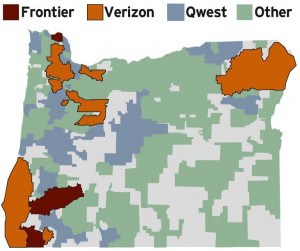Rep. Eric Massa (D-New York), author of the Broadband Internet Fairness Act (HR 2902) — legislation that would ban Internet Overcharging, announced he will resign his office Monday.
In a fast-moving series of events, Massa first announced he would not seek re-election because of health reasons — the congressman faces a renewed battle with cancer, but allegations of ethical violations also surfaced earlier this week which have gotten national news coverage.
Massa is a first term congressman in New York’s 29th Congressional district, which has traditionally elected Republican candidates to office. But as the national Republican party has trended further to the right, northeastern Republicans have become an endangered species in Congress. Former Rep. Randy Kuhl only held onto the seat for two terms before being defeated by Massa in 2008. Kuhl himself replaced retired congressman Amo Houghton, a long-serving moderate Republican whose voting record often split with the national Republican party on major issues.
Massa’s decision not to run for re-election surprised voters in his district, which runs from suburban Rochester to the Pennsylvania border along the southern tier. Friday’s sudden announcement he’ll also resign his office effective Monday shocked voters and started a scramble for who might assume Massa’s seat upon his resignation.
The loss of Eric Massa to the Stop the Cap! cause is a concern for broadband consumers. Massa stepped up to protect consumers from an Internet Overcharging experiment proposed last April by Time Warner Cable, which serves most of his district. Massa immediately blasted the cable company’s plan to test usage-based billing on residential customers in the Rochester area, which is the only major city in New York State not served by Verizon and its expanding fiber to the home FiOS system.
Massa’s proposed legislation would have banned such schemes unless a company could demonstrate a clear financial need to adopt consumption billing and usage limits.
 Thankfully, New York senator Chuck Schumer (D-NY) remains in office, and is the only senator to protest Time Warner Cable’s experiment, and helped end it, not just for residents of western New York, but for residents of Texas and North Carolina as well.
Thankfully, New York senator Chuck Schumer (D-NY) remains in office, and is the only senator to protest Time Warner Cable’s experiment, and helped end it, not just for residents of western New York, but for residents of Texas and North Carolina as well.
As to the swirling of allegations surrounding Massa, I have no interest in expanding on them here. You can get a detailed review of the congressman’s views on these issues by listening to a 90-minute radio show aired today on a WKPQ-FM in Hornell, New York. Today’s show will probably break news because Massa expands in great detail what’s behind the allegations and the reasons for his retirement.
Eric Massa’s regular Sunday show on WKPQ-FM Hornell, NY today discussed his decision to resign his office in great detail. (90 minutes)
You must remain on this page to hear the clip, or you can download the clip and listen later.
As for his replacement, a number of Democrats from both the southern tier and Monroe County/Rochester are considering entering the race. Massa’s already-campaigning Republican opponent, former Corning Mayor Tom Reed remains in the race. The Republican county supervisor for Monroe County, Maggie Brooks, is also considering a run. But so is the former Congressman Randy Kuhl. “Randy the Dandy” would be the worst possible option. His undistinguished record and contempt for his constituents makes my skin crawl. In his last term, Kuhl refused to hold open town hall meetings, instead shepherding constituents in for ‘five minutes with Randy’ where someone took notes and another escorted you out when your time was up. Nobody should have bothered to take notes — his ongoing lack of concern about what voters in his district thought helped him lose his seat in the first place. His lack-of-listening tour would fit perfectly with certain cable companies who don’t listen to their customers. Hopefully, voters will not contemplate a return of Randy Kuhl. Four years was more than enough.
We’ll be looking for other members of Congress to take up where Eric Massa left off. I would like to thank Congressman Massa for his hard work on behalf of our cause, as well as helping make a difference on so many other matters important to the voters in his district. I wish him good health and best wishes.
[flv]http://www.phillipdampier.com/video/Eric Massa Resigns Monday 3-6-10.flv[/flv]
Several television stations announced Rep. Massa’s decision to resign his office Friday in “breaking news” headlines. This clip has three reports from WETM-TV Elmira, WHAM-TV Rochester, and WENY-TV Corning. (6 minutes)
[flv]http://www.phillipdampier.com/video/Eric Massa Reactions 3-6-10.flv[/flv]
Residents in the 29th congressional district react to Rep. Massa’s resignation announcement, and local politicians jockey for position to potentially run for Massa’s seat. Three reports are included from WHAM-TV Rochester, WROC-TV Rochester, and WENY-TV Corning. (6 minutes)


 Subscribe
Subscribe









